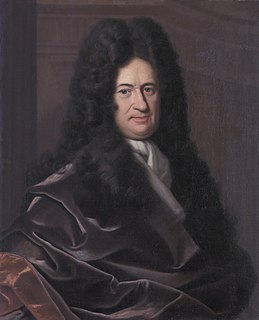
The University of Hanover, officially the Gottfried Wilhelm Leibniz Universität Hannover, short Leibniz University Hannover, is a public university located in Hannover, Germany. Founded on May 2, 1831, it is one of the largest and oldest science and technology universities in Germany. In the 2014/15 school year it enrolled 25,688 students, of which 2,121 were from foreign countries. It has nine faculties which offer 190 full and part degree programs in 38 fields of study. The University is named after Gottfried Wilhelm Leibniz, the 18th century mathematician and philosopher.
The alphabet of human thought is a concept originally proposed by Gottfried Leibniz that provides a universal way to represent and analyze ideas and relationships by breaking down their component pieces. All ideas are compounded from a very small number of simple ideas which can be represented by a unique character.
The Calculus ratiocinator is a theoretical universal logical calculation framework, a concept described in the writings of Gottfried Leibniz, usually paired with his more frequently mentioned characteristica universalis, a universal conceptual language.
Leibniz's rule may refer to one of the following:
Vis viva is a historical term used for the first (known) description of what we now call kinetic energy in an early formulation of the principle of conservation of energy.
The Discourse on Metaphysics is a short treatise by Gottfried Wilhelm Leibniz in which he develops a philosophy concerning physical substance, motion and resistance of bodies, and God's role within the universe. It is one of the few texts presenting in a consistent form the earlier philosophy of Leibniz.
The Monadology is one of Gottfried Leibniz's best known works representing his later philosophy. It is a short text which sketches in some 90 paragraphs a metaphysics of simple substances, or monads.

The phrase "the best of all possible worlds" was coined by the German polymath Gottfried Leibniz in his 1710 work Essais de Théodicée sur la bonté de Dieu, la liberté de l'homme et l'origine du mal. The claim that the actual world is the best of all possible worlds is the central argument in Leibniz's theodicy, or his attempt to solve the problem of evil.

The Leibniz Association is a union of German non-university research institutes from various branches of study.
The calculus controversy was an argument between the mathematicians Isaac Newton and Gottfried Wilhelm Leibniz over who had first invented calculus. The question was a major intellectual controversy, which began simmering in 1699 and broke out in full force in 1711. Leibniz had published his work first, but Newton's supporters accused Leibniz of plagiarizing Newton's unpublished ideas. Leibniz died in disfavor in 1716 after his patron, the Elector Georg Ludwig of Hanover, became King George I of Great Britain in 1714. The modern consensus is that both men developed their ideas independently.

The German Academy of Sciences at Berlin or AdW, later renamed the Academy of Sciences of the German Democratic Republic, was the most important research institution of East Germany.
The Max Planck Institute for Developmental Biology is located in Tübingen, Germany; it was founded in 1954 as an offshoot of the Tübingen-based Max Planck Institute for Biology. The main topics of scientific research conducted by the Max Planck Institute for Developmental Biology focus on the molecular mechanisms underlying spatial information within the embryo, communication between cells in the induction process, as well as the formation and differentiation of tissues and organs.
Leibniz's gap is a philosophy of mind term that is used to refer to the problem that thoughts cannot be observed or perceived solely by examining brain properties, events, and processes. Here the word "gap" is a metaphor of a subquestion regarding the mind–body problem that allegedly must be answered in order to reach a more profound understanding of consciousness and emergence. A theory that could correlate brain phenomena with psychological phenomena would "bridge the gap".
The law of continuity is a heuristic principle introduced by Gottfried Leibniz based on earlier work by Nicholas of Cusa and Johannes Kepler. It is the principle that "whatever succeeds for the finite, also succeeds for the infinite". Kepler used The Law of Continuity to calculate the area of the circle by representing the latter as an infinite-sided polygon with infinitesimal sides, and adding the areas of infinitely-many triangles with infinitesimal bases. Leibniz used the principle to extend concepts such as arithmetic operations, from ordinary numbers to infinitesimals, laying the groundwork for infinitesimal calculus. A mathematical implementation of the law of continuity is provided by the transfer principle in the context of the hyperreal numbers.

The Leibniz Review is a peer-reviewed academic journal devoted to scholarly examination of Gottfried Leibniz’s thought and work. It publishes contemporary articles and reviews, as well as original Leibniz texts. The Leibniz Review is sponsored by the Leibniz Society of North America and is produced at Ohio State University in Mansfield, Ohio. All issues are available online from the Philosophy Documentation Center.

The German Research Institute for Public Administration is a non-university research institute for public administration located in Speyer, Rhineland Palatinate, Germany. Founded in 1976 as an organizationally independent institution under the jurisdiction of the Minister-President of Rhineland-Palatinate, it is largely integrated in, and maintains a strategic partnership with the German University of Administrative Sciences Speyer. As an "institution of nationwide interest" it forms part of the Gottfried Wilhelm Leibniz Scientific Community and is thus funded equally by the Federal Republic and all 16 German states. At present the institute has 26 ordinary, 19 corresponding and two honorary fellows from Germany and abroad.
Studia Leibnitiana is a biannual peer-reviewed academic journal established in 1969. It publishes scholarly articles on philosophy and the history of science of the early modern period, especially related to the German philosopher and polymath Gottfried Wilhelm Leibniz.
Gottfried Wilhelm (von) Leibniz ; German polymath, philosopher logician, mathematician. Developed differential and integral calculus at about the same time and independently of Isaac Newton. Leibniz earned his keep as a lawyer, diplomat, librarian, and genealogist for the House of Hanover, and contributed to diverse areas. His impact continues to reverberate, especially his original contributions in logic and binary representations.







